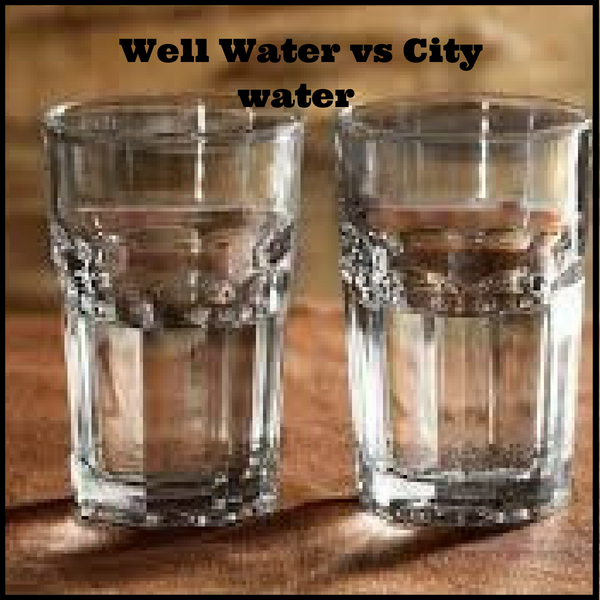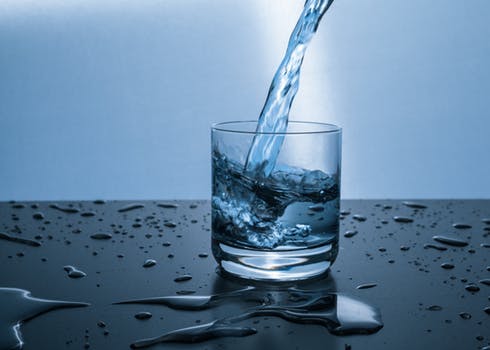 I was visiting a friend who uses well water, and we started a debate on which is better between city water or private well water.
I was visiting a friend who uses well water, and we started a debate on which is better between city water or private well water.
And so, I did some research.
Did You know:
40 million people in the US get their water from wells while 280 million use city water.
City Water Vs Well Water pro and Cons
Here’re the benefits and risks of using either well water or city water.
City Water
- You will not have maintenance expenses
- Eliminate the risk of running out of water because in most cases cities ensure residents have adequate water
- Your water pressure could increase because the city water generally has a higher pressure.
- City water is always treated by adding chlorine or chloramines.
- You will not have maintenance expenses
- Eliminate the risk of running out of water because in most cases cities ensure residents have adequate water
- Your water pressure could increase because the city water generally has a higher pressure.
- City water is always treated by adding chlorine or chloramines.
Well Water
- Rich in minerals making it healthier
- Not treated with unhealthy chemicals such as chlorine and chloramine
- After the initial cost of drilling the well, the water expenses are much lower, and this comes in handy when constructing.
- Water from a well is dependable and reliable.
- Constructing a well tends to increase the value of a property.
- Risk of contamination with well water. Although water is gotten deep below the surface, some surface contaminants could find their way into the water.
- A well might get depleted during a drought, and you have to wait for it to be replenished.
- You have to use well maintenance companies to check the well regularly, and they will charge you for it.
- The well has to tested regularly for bacteria
- You might need to invest in an expensive filtration system when your well water becomes contaminated with chemicals such as pesticides, human waste, and industrial chemicals.
- You need to have backup generators because when the power goes off; your water supply is interrupted.
Things to know about having a Private well water
If you want to construct a well or buy a property that has a well, you should know that different states and municipalities have rules and regulations controlling how wells are constructed and managed.
For example, Most municipalities require wells to be tested. The quality of water should pass a quality test to get papers.
Also, some areas to construct a well you will need to have a permit, so before you buy a house make sure you see the permit.
You should be on the lookout for any sudden change in the quality of water. The difference in taste is usually an indication of outside contaminants and you will need to install a sediment filter.
A Private well needs to covered by a vermin-proof cap to keep out rainwater.
Finally, you should be careful when constructing things near the well. In fact, some states code separation distances.
Questions to ask when buying a house with a well.
- What was the original method of constructing the well?
- When was the well built?
- Are the records of the well available? Including a well log and inspection reports?
- Is the well regularly maintained?
- Is the wellhead visible and above the ground?
- What is the thickness of the well casing of the lining of the well?
- Is the well cap vermin proof?
- What is the capacity of the well?
How to make well water safe for drinking
According to the Environmental Protection Agency (EPA), 15% of Americans use well water for drinking.
Drinking contaminated well water can cause health conditions such as diarrhea and vomiting.
Well, water should be tested annually to ensure it is not contaminated by bacteria and nitrates.
To ensure that the water is safe for drinking, proper maintenance is critical. You should ensure that there is no cracked or corroded well casings and the well caps.
Water Purification systems
Filters and other private purification systems help to make water safe for drinking. Although filters are efficient in removing contaminants, you should test the quality of water before relying on filters.
Is well water good for your skin?
Water that contains a high concentration of minerals like most well water can make the skin dry and clog pores. This can trigger skin conditions like eczema and acne.
Also, mineral-rich water tends to react with soap to form salts. These salts are then deposited on the skin making your skin feel itchy. Also, water rich in calcium does not dissolve soap or detergents.
To avoid the negative of hard water on your skin, you should install a shower head filter or water softening product.
Living with well water and septic tank
 According to EPA, there are three main areas that you need to keep an eye on.
According to EPA, there are three main areas that you need to keep an eye on.
First, a Septic Service Professional should inspect the septic at least once in three years. He or she will examine for leaks.
In addition, household septic should be pumped regularly depending on household size, and septic tank size.
Second, use water efficiently. All households should seek to conserve water because efficient water consumption prevents the septic from fill out up quickly.
Finally, because everything that is flushed ends up in the septic tanks, you should ensure not pour down the toilet, sink or shower anything other than human waste.
Converting well water to city water
If you’re currently using water from a well, you may opt to start using city water. The cost involved in installing city water depends on if there is a city water pipe near your street.
The cost of hooking up city water ranges from $ 1,000 to $ 3,000.
You should contact the municipality water department to find out how much it will cost to hook up.
Can you have a septic tank and city water?
Some people prefer to use city water, but avoid the city sewer system because of problems associated with city sewer systems.
However, in most cities water bill is linked to the sewer system. Some municipalities have a specific code on how to separate the two billings.
Typically, the septic tank has to be inspected, tested and certified before city water is hooked up to a home that is not connected to the sewer system.
Conclusion
Personally, I will choose city water over Well water every time. I just don’t have the stomach of doubting whether the water I’m consuming is safe or not. There is some comfort in knowing my water has been treated by water experts at the city water treatment plant.
ABOUT LEON SMITH
 Leon is a Thirty-Something-Year-old blogger from Mauritius who is currently studying for a Master’s degree in chemical and processing Engineering at the University of Eldoret in Kenya. Read more about him.
Leon is a Thirty-Something-Year-old blogger from Mauritius who is currently studying for a Master’s degree in chemical and processing Engineering at the University of Eldoret in Kenya. Read more about him.
